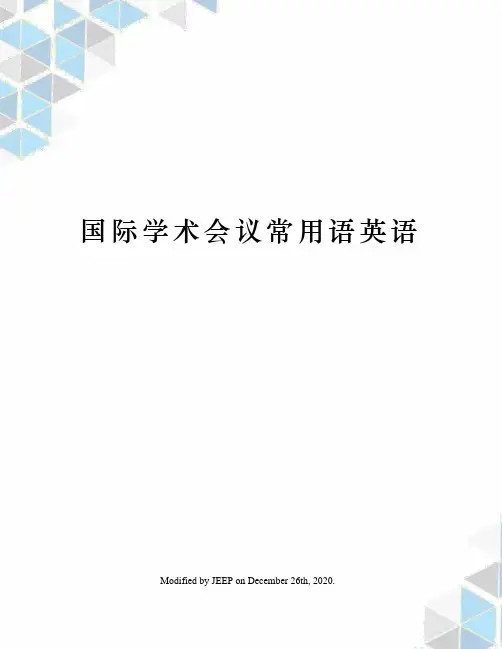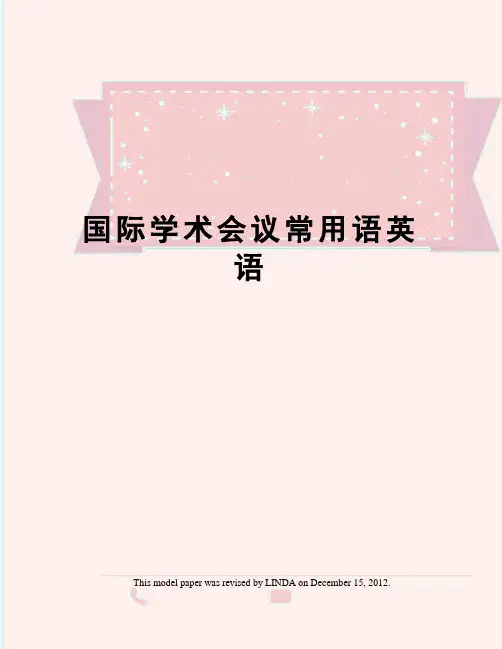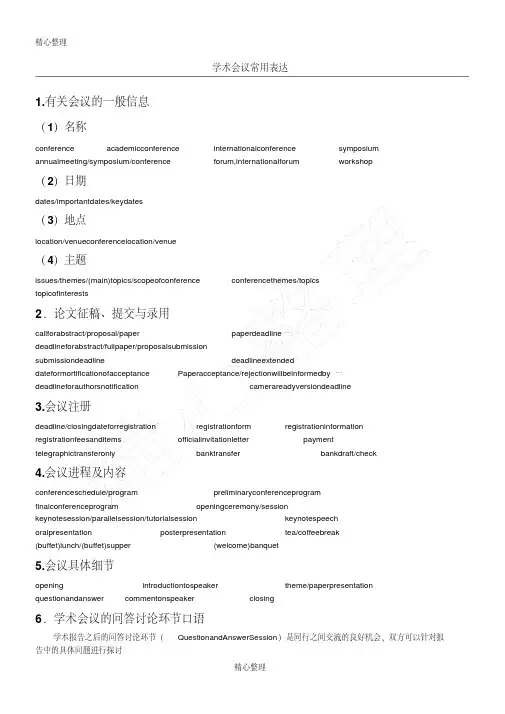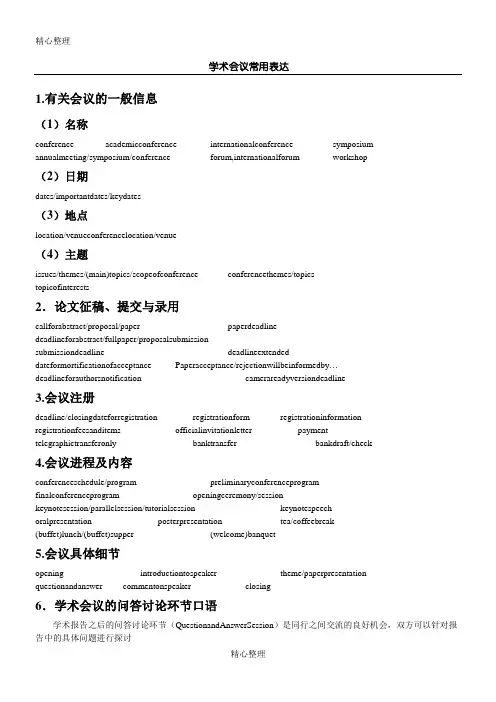国际学术会议常用语(英语)
国际会议发言开场白

国际会议发言开场白国际会议发言开场白【篇一:英文学术报告开场白、结束语】問侯語或開場白的寒喧(greetings)開場白很重要,最常用的問候是“ladies and gentlemen”,但要視場合而定。
例如在會議討論會場合時,經由主席介紹上台時可先說mr.chairman,honorable guest,ladies and gentlemen,good morning ,its very great pleasure indeed for me to be able to attend this meeting主席先生,各位貴賓,各位女士,先生早安.非常榮幸能參加這次的會議。
或者你也可以說im hornored and proud to have the opportunity to speak at this meeting .禮貌性的問侯語這是對主持人和來賓的一種尊重。
開始簡報(opening a presentation)—提出簡報摘要在正式進入主題之前可先扼要說明簡報的內容與順序,幫助聽眾了解您的報告的大概內容。
例1.today i would like to present my paper“the challenges of pharmacy practice in taiwan”,in the first part of the report ,im going to begin with a few general comments concerning the taiwan medical care enviroment recently, and then discuss in more detail specific issue which concerned community pharmacy, and how the national health cave insurance influence the future of pharmacist career?例2.你亦可將要簡報的摘要條列式的依序說明。
国际学术会议常用语(英语)

学术会议常用表达1. 有关会议的一般信息(1)名称conference academic conference international conference symposium annual meeting/symposium/conference forum, international forum workshop(2)日期dates/important dates/key dates(3)地点location/venue conference location/venue(4)主题issues/themes/(main)topics/scope of conference conference themes/topicstopic of interests2.论文征稿、提交与录用call for abstract/proposal/paper paper deadlinedeadline for abstract/full paper/proposal submissionsubmission deadline deadline extendeddate for mortification of acceptance Paper acceptance/rejection will be informed by…deadline for authors notification camera ready version deadline3. 会议注册deadline/closing date for registration registration form registration information registration fees and items official invitation letter payment telegraphic transfer only bank transfer bank draft/check4. 会议进程及内容conference schedule/program preliminary conference programfinal conference program opening ceremony/sessionkeynote session/parallel session/tutorial session keynote speechoral presentation poster presentation tea/coffee break (buffet) lunch/(buffet)supper(welcome)banquet5. 会议具体细节opening introduction to speaker theme/paper presentation question and answer comment on speaker closing6.学术会议的问答讨论环节口语学术报告之后的问答讨论环节(Question and Answer Session)是同行之间交流的良好机会,双方可以针对报告中的具体问题进行探讨(1)答问的方式与技巧回答讨论环节可以让报告人通过互动及时地获得信息反馈并可以把在讨论中或得的建设性建议用于下一步的工作,因此对科研工作有很大的促进作用。
国际学术会议常用语英语

国际学术会议常用语英语 Modified by JEEP on December 26th, 2020.学术会议常用表达1. 有关会议的一般信息(1)名称conference academic conference international conferencesymposiumannual meeting/symposium/conference forum, international forum workshop(2)日期dates/important dates/key dates(3)地点location/venue conference location/venue(4)主题issues/themes/(main)topics/scope of conference conference themes/topicstopic of interests2.论文征稿、提交与录用call for abstract/proposal/paper paper deadline deadline for abstract/full paper/proposal submissionsubmission deadline deadline extended date for mortification of acceptance Paper acceptance/rejection will be informed by…deadline for authors notification camera ready version deadline3. 会议注册deadline/closing date for registration registration form registration informationregistration fees and items official invitation letterpaymenttelegraphic transfer only bank transferbank draft/check4. 会议进程及内容conference schedule/program preliminary conference program final conference program opening ceremony/session keynote session/parallel session/tutorial session keynote speechoral presentation poster presentationtea/coffee break(buffet) lunch/(buffet)supper (welcome)banquet5. 会议具体细节opening introduction to speakertheme/paper presentationquestion and answer comment on speaker closing6.学术会议的问答讨论环节口语学术报告之后的问答讨论环节(Question and Answer Session)是同行之间交流的良好机会,双方可以针对报告中的具体问题进行探讨(1)答问的方式与技巧回答讨论环节可以让报告人通过互动及时地获得信息反馈并可以把在讨论中或得的建设性建议用于下一步的工作,因此对科研工作有很大的促进作用。
国际学术会议常用语英语

国际学术会议常用语英语This model paper was revised by LINDA on December 15, 2012.学术会议常用表达1. 有关会议的一般信息(1)名称conference academic conference international conference symposiumannual meeting/symposium/conference forum, international forum workshop(2)日期dates/important dates/key dates(3)地点location/venue conference location/venue(4)主题issues/themes/(main)topics/scope of conference conference themes/topics topic of interests2.论文征稿、提交与录用call for abstract/proposal/paper paper deadlinedeadline for abstract/full paper/proposal submissionsubmission deadline deadline extendeddate for mortification of acceptance Paper acceptance/rejectionwill be informed by…deadline for authors notification camera ready version deadline3. 会议注册deadline/closing date for registration registration form registration informationregistration fees and items official invitation letter paymenttelegraphic transfer only bank transferbank draft/check4. 会议进程及内容conference schedule/program preliminary conference programfinal conference program opening ceremony/session keynote session/parallel session/tutorial sessionkeynote speechoral presentation poster presentationtea/coffee break(buffet) lunch/(buffet)supper (welcome)banquet5. 会议具体细节opening introduction to speakertheme/paper presentationquestion and answer comment on speakerclosing6.学术会议的问答讨论环节口语学术报告之后的问答讨论环节(Question and Answer Session)是同行之间交流的良好机会,双方可以针对报告中的具体问题进行探讨(1)答问的方式与技巧回答讨论环节可以让报告人通过互动及时地获得信息反馈并可以把在讨论中或得的建设性建议用于下一步的工作,因此对科研工作有很大的促进作用。
国际学术会议常用语(英语)

④问题的类型
对于寻求具体解释的一些问题, 可以简单地重复报告的内容来对问题进行说明或证明,
或是澄清听众的误解。 如
果提问者对报告内容提出不同见解,可以通过资料、事实、数据等来证明自己的观点,但一定注意态度要礼貌谦
和。 对于过于复杂的深层问题无法进行简单回答时, 可以在简略回答之后邀约提问者在其他时间进行讨论。
准备作为准备工作的一部分,进行深入考虑,全面的预测听众可能提出的问题,可以假设一些问题,并准备好最
合适的解答。如果会议没有统一安排每个报告的问答环节,报告者在进行报告时就要预先告知听众随后的
Q&
ASession,这样可以让听众为提问做好准备。
②过程控制
在时间允许的情况下尽可能让每个想提问的人都有机会提问,
③答问方式
应首先仔细听清问题, 在回答之前应将问题清楚的重复一遍, 这可以保证对问题的正确理解, 确保每个人都能听 清楚问题,同时给自己一些时间来思考,表述答案前可做片刻停留,这既引起了听众的注意,又表明了对答案的 谨慎态度, 同时也给自己留更多的思考空间。 不要对问题进行评价, 避免说类似 “ Thatwasagreatquestion”的话, 如果想要对某一问题进行肯定,可以用“ Thanksforaskingthatquestion ”或“ Igetaskedthatquestionbymanypeople. ” 等中性的表述,还可以让听众感到平等。回答问题时应尽可能简洁,切题。在回答中应尽可能多地提及报告中的 内容,这有利于听众对报告内容加深印象,并有利于控制问答环节的主题。
精心整理
学术会议常用表达
1.有关会议的一般信息
( 1)名称
conference
academicconference
国际学术会议常用语(英语)

学术会议常用表达1.有关会议的一般信息(1)名称conference academicconference internationalconference symposiumannualmeeting/symposium/conference forum,internationalforum workshop(2)日期(3(423.4.keynotesession/parallelsession/tutorialsession keynotespeechoralpresentation posterpresentation tea/coffeebreak(buffet)lunch/(buffet)supper (welcome)banquet5.会议具体细节opening introductiontospeaker theme/paperpresentation questionandanswer commentonspeaker closing6.学术会议的问答讨论环节口语学术报告之后的问答讨论环节(QuestionandAnswerSession)是同行之间交流的良好机会,双方可以针对报告中的具体问题进行探讨(1)答问的方式与技巧回答讨论环节可以让报告人通过互动及时地获得信息反馈并可以把在讨论中或得的建设性建议用于下一步的工作,因此对科研工作有很大的促进作用。
对于如此重要的环节,报告人在报告之前应进行必要的准备,尽可能地保证这一环节完整、流畅地进行,一般应注意以下几点。
①准备工作学术报告中的提问者往往是相关领域中的专家,对报告的内容非常熟悉,因此所提出的问题可能会有相当的深度、广度以及不可预见性,有时甚至直接指出研究工作中的不完善之处或漏洞所在。
由于时间关系,回答者在现场一般没有充分的时间进行考虑,这就要求报告人要事先进行充分的准备。
在报告前,报告人应将对答环节的准备作为准备工作的一部分,进行深入考虑,全面的预测听众可能提出的问题,可以假设一些问题,并准备好最合适的解答。
国际学术会议常用语(英语)
学术会议常用表达1. 有关会议的一般信息(1)名称conference academic conference international conference symposiumannual meeting/symposium/conference forum, international forum workshop(2)日期dates/important dates/key dates(3)地点location/venue conference location/venue(4)主题issues/themes/(main)topics/scope of conference conference themes/topics topic of interests2.论文征稿、提交与录用call for abstract/proposal/paper paper deadlinedeadline for abstract/full paper/proposal submissionsubmission deadline deadline extendeddate for mortification of acceptance Paper acceptance/rejection will be informed by…deadline for authors notification camera ready version deadline3. 会议注册deadline/closing date for registration registration form registration informationregistration fees and items official invitation letter paymenttelegraphic transfer only bank transferbank draft/check4. 会议进程及内容conference schedule/program preliminary conference programfinal conference program opening ceremony/sessionkeynote session/parallel session/tutorial session keynote speechoral presentation poster presentation tea/coffeebreak(buffet) lunch/(buffet)supper (welcome)banquet5. 会议具体细节opening introduction to speaker theme/paper presentationquestion and answer comment on speaker closing6.学术会议的问答讨论环节口语学术报告之后的问答讨论环节(Question and Answer Session)是同行之间交流的良好机会,双方可以针对报告中的具体问题进行探讨(1)答问的方式与技巧回答讨论环节可以让报告人通过互动及时地获得信息反馈并可以把在讨论中或得的建设性建议用于下一步的工作,因此对科研工作有很大的促进作用。
国际会议交流英语综合知识概要
1
会议通知 (conference notice)
2
会议日程表(conference schedule / program)
3
会议邀请函(conference invitation)
4
论文征集 (call for papers)
5
会议回执(letter of acceptance to a conference)
Colloquium 2008 16
Brief Introduction of Conference
大会开幕式
General Assembly
全体大会
Plenary Sessions
Formal Meetings
张贴会
Poster Sessions
Oral Presentation (SimPualrtaalnleeloSuessSseiosnsisonsP) oster Presentation
21
Visits and Other Social Activities
• Visits to famous places, such as research institutes, universities, museums, or historical spots.
• Various social events, such as banquets, parties, excursions, games,etc.
8
Brief Introduction of Conference
Meeting
Conference
Symposium
Congress
会议
Seminar
Convention
国际会议交流英语一般知识概要
Brief Introduction of Conference
Meeting
Conference
Symposium
Congress
会议
Seminar
Convention
Workshop Colloquium Forum
Forum——论坛,公众会议,讨论大众关心问题的集 会。如Education Forum, Finance Forum
on Polymer Hydrogel
Brief Introduction of Conference
Meeting Symposium
Conference Congress
Convention Colloquium Forum
会议
Seminar
Workshop
Seminar——讨论会,如教授定期与学生讨论他们的报 告和发现、研究生班的专题讨论会。Research Seminar (科 研讨论会)、Teaching Seminar(课堂讨论会)、 Problem Seminar (问题讨论会) 9
国际会议交流英语
1
Brief Introduction of Conference
Meeting Conference Symposium
Congress
会议
Seminar
Convention
Workshop
Colloquium Forum
Meeting——会议,最一般的用词,规模可大可小,层 次可高可低,可以是正式或非正式的聚会,如告别会 议、联席会议、首脑会议、紧急会议等。 2
(1 )This first International Conference on Water and Society aims to provide a multi-disciplinary forum for the presentation and discussion of many issues affecting water resources today.
国际学术交流英语ppt课件
职务、学术成果、社会活动、其他个人信 息) • 3. 发言顺序 • 4. 邀请第一位演讲人
Task 1 介绍发言人
• Ⅰ Before listening, please read the useful patterns and expressions often used in introducing a a speaker in the data bank.
Unit Three 会议发言
• Ⅰ常用词汇:
• 1.回顾常用的会议用语
Unit Three 会议发言
• Ⅰ常用词汇:
• 1.会议用语
• Meeting
• 普通用词,词义广泛。指一般性的会议,可用于 各种场合。
• e.g. •
• 峰会 • a summit meeting • 参加会议 • attend a meeting
• a farewell meeting
• 联欢会
• a convivial meeting
• 筹备会议
• preparatory meeting
Unit Three 会议发言
• Ⅰ常用词汇:
• Conference
• (通常持续几天的大型正式)会议, 如政府工作会 议、国际学术交流会议、各国之间的协商、会谈 等。
• 研讨会、专题报告 symposium (pl.
symposia/symposium)
• is a kind of meeting, but if refers exclusively to the meetings for specialized academic discussion.
• The symposium on AIDS research lasted two days.
- 1、下载文档前请自行甄别文档内容的完整性,平台不提供额外的编辑、内容补充、找答案等附加服务。
- 2、"仅部分预览"的文档,不可在线预览部分如存在完整性等问题,可反馈申请退款(可完整预览的文档不适用该条件!)。
- 3、如文档侵犯您的权益,请联系客服反馈,我们会尽快为您处理(人工客服工作时间:9:00-18:30)。
学术会议常用表达1. 有关会议的一般信息(1)名称conference academic conference international conference symposiumannual meeting/symposium/conference forum, international forum workshop(2)日期dates/important dates/key dates(3)地点location/venue conference location/venue(4)主题issues/themes/(main)topics/scope of conference conference themes/topics topic of interests2.论文征稿、提交与录用call for abstract/proposal/paper paper deadlinedeadline for abstract/full paper/proposal submissionsubmission deadline deadline extendeddate for mortification of acceptance Paper acceptance/rejection will be informed by…deadline for authors notification camera ready version deadline3. 会议注册deadline/closing date for registration registration form registration informationregistration fees and items official invitation letter paymenttelegraphic transfer only bank transferbank draft/check4. 会议进程及容conference schedule/program preliminary conference programfinal conference program opening ceremony/sessionkeynote session/parallel session/tutorial session keynote speechoral presentation poster presentation tea/coffeebreak(buffet) lunch/(buffet)supper (welcome)banquet5. 会议具体细节opening introduction to speaker theme/paper presentationquestion and answer comment on speaker closing6.学术会议的问答讨论环节口语学术报告之后的问答讨论环节(Question and Answer Session)是同行之间交流的良好机会,双方可以针对报告中的具体问题进行探讨(1)答问的方式与技巧回答讨论环节可以让报告人通过互动及时地获得信息反馈并可以把在讨论中或得的建设性建议用于下一步的工作,因此对科研工作有很大的促进作用。
对于如此重要的环节,报告人在报告之前应进行必要的准备,尽可能地保证这一环节完整、流畅地进行,一般应注意以下几点。
①准备工作学术报告中的提问者往往是相关领域中的专家,对报告的容非常熟悉,因此所提出的问题可能会有相当的深度、广度以及不可预见性,有时甚至直接指出研究工作中的不完善之处或漏洞所在。
由于时间关系,回答者在现场一般没有充分的时间进行考虑,这就要求报告人要事先进行充分的准备。
在报告前,报告人应将对答环节的准备作为准备工作的一部分,进行深入考虑,全面的预测听众可能提出的问题,可以假设一些问题,并准备好最合适的解答。
如果会议没有统一安排每个报告的问答环节,报告者在进行报告时就要预先告知听众随后的Q&A Session,这样可以让听众为提问做好准备。
②过程控制在时间允许的情况下尽可能让每个想提问的人都有机会提问,不要让少数提问者的提问占据整个讨论环节,应按照提问者举手示意的顺序来请出提问者。
在开始回答问题时,首先与提问者目光接触,然后转向其他所有听众,这样可以获得所有听众的注意。
在回答完毕之后,可以再次通过目光了解提问者是否对回答表示满意。
报告人应控制整个讨论的过程,对于与主题无关的问题可以礼貌地回避。
③答问方式应首先仔细听清问题,在回答之前应将问题清楚的重复一遍,这可以保证对问题的正确理解,确保每个人都能听清楚问题,同时给自己一些时间来思考,表述答案前可做片刻停留,这既引起了听众的注意,又表明了对答案的谨慎态度,同时也给自己留更多的思考空间。
不要对问题进行评价,避免说类似“That was a great question”的话,如果想要对某一问题进行肯定,可以用“Thanks for asking that question”或“I get asked that question by many people.”等中性的表述,还可以让听众感到平等。
回答问题时应尽可能简洁,切题。
在回答中应尽可能多地提及报告中的容,这有利于听众对报告容加深印象,并有利于控制问答环节的主题。
④问题的类型对于寻求具体解释的一些问题,可以简单地重复报告的容来对问题进行说明或证明,或是澄清听众的误解。
如果提问者对报告容提出不同见解,可以通过资料、事实、数据等来证明自己的观点,但一定注意态度要礼貌谦和。
对于过于复杂的深层问题无法进行简单回答时,可以在简略回答之后邀约提问者在其他时间进行讨论。
对于听众的评价或是建议应表示感,但要控制时间,适时地打断发言人并转入下一个问题。
对不知道答案的问题应坦率的承认,不要回避或转换话题,并尽可能提供相关的书籍,资料或是该方面的专家以供参考。
⑤时间的把握为了能够巧妙地结束回答问题环节,可事先准备一段总结性的述用来重申报告主题并结束问答环节。
注意在达到规定时间时应立刻结束讨论环节,在回答最后一个问题之前们就要礼貌地表示即将超时,并可以让其他提问者将问题留在会后进行讨论。
⑥提问者的礼仪大型会议中回答环节的时间往往比较短暂,提问者应抓住机会参与讨论,同时应注意以下方面。
如果为提问者准备了麦克风,则应在拿到麦克风后等待阿加安静下来在进行提问;大声地表述,让提问者和听众都能够听清楚问题;不必解释提问的理由以免浪费时间,但如果适宜可以需要地介绍自己(一定要简要);对所提的问题应做好准备,以保证问题的有效性(不要提那些答案显而易见的问题)提问务必简短;每次尽量只提一个问题,把更多的机会留给其他听众。
(2)常用表达①提问I would like to ask/address/raise a question about…I would like to know(whether)…I would be glad to know(whether)…I have a question about…May I ask (a question about)…?My question is/concerns//is concerned with…What I would like to ask is…What I am asking is …I wonder if you would like to explain/comment on the point of…I would be grateful/appreciate/obliged/for(to have) some explanation about…I wonder if you would be kind enough to explain/comment on/give some example for…I wonder (What I am wondering is)…I am curious about/interested in/keen on(whether/why/how/what/when)…?Could you please tell me whether/why/how/what/when…?Do you mind showing me whether/why/how/what/when…?I could not understand what you really mean by…Do you have any ideas about…?What do you think of/about…?Could you back…up?Could you give us an example about…?Could you provide any example to prove what you have said about…?Could you give any example that shows…?②回答a. 对问题进行确认Are you asking me the question about…?I am not quite about the question? Do you mean…?I am not quite sure what your question is. Could you address your question more specifically?What do you mean by…?I don’t known whether I have understood your question correctly. Do you mean….?b.肯定会否定的表示Yes. /I do.The answer is (not) correct/true/right…Exactly!Precisely!I think so.I think you’re right.I don’t think so.That is just what I mean.That is not what I mean.I (don’t) believe/consider/suppose/regard the viewpoint is true.Sure. /Absolutely. /Certainly. /Definitely.No, (absolutely/certainly/definitely) not.I’m in complete agreement.I (quite) agree.I couldn’t agree more.c. 正面回答My answer(to the question) is…To answer this question, I would like to say that…The direct/simple/brief answer to the question is…Let me answer your question by same examples of…I’d like to make a few comments on/explanation about…I think I can give you a few general comments on/explanation about…To comment on the question of you, I have made comparison between… and…I’d like to present/offer/give/express/state my opinion on…In my opinion, the conclusion can be supported by the experimental result that…To answer your question, I’d like to repeat what I said just know.I think this picture will be helpful for your understanding.Here, I’d like to explain it briefly.My idea is on the basis of two points. The first is…, and the second is…I will explain by some examples.d.非正面回答Now I can only present same estimation about that…As far as I know, little in-depth research has bean carried out yet.I can only provide/I have only a partial answer to that question.That’s one possible explanation, but not the only one.I’m afraid it’s a bit difficult for me to present some experimental data at the moment to support the theory since my idea is mainly out of theoretical consideration.I’m afraid the question is too complicated to be answered with a few words. I’d like to discuss it with you after the session.I think the answer to the question needs some further study.I’m afraid is not within the field of the presentation.I’m not sure if what you’re saying has any relevance here.I’m not sure if what you’re saying has anything to do with our problem.I’m not sure if what you’re saying really matters in this case.I’m not sure if what you’re saying is relevant to our problem.e. 无法回答时的表述I’m sorry my experience/knowledge about your question is very limited so I think I cannot give a good answer to your question.I’m sorry I really don’t know the answer to the question.Unfortunately I cannot answer the question at the moment.I’m afraid I have no idea how to answer your question (about that).Sorry, I’m afraid I know little about that matter, so I don’t think I can answer your question right now.It’s quite difficult for me to answer that question now.I can’t really recall; I’ll have to get back to you on that.I can’t quite remember; I’ll need to do a little checking and get back to you.I can’t fully remember; I’ll have to check up on it.I can’t recall all the facts; I’ll have to get back to you.f.回答之后的表述I wonder whether my question is helpful to you.Does that answer your question in a right way?Is my explanation clear enough?Is that what you wanted me to answer?Would anyone like to and anything (to what I’ve said)?Would anyone care to comment?Would anyone like to give their ideas on this?Would anyone care to add their thoughts(to the discussion)?。
